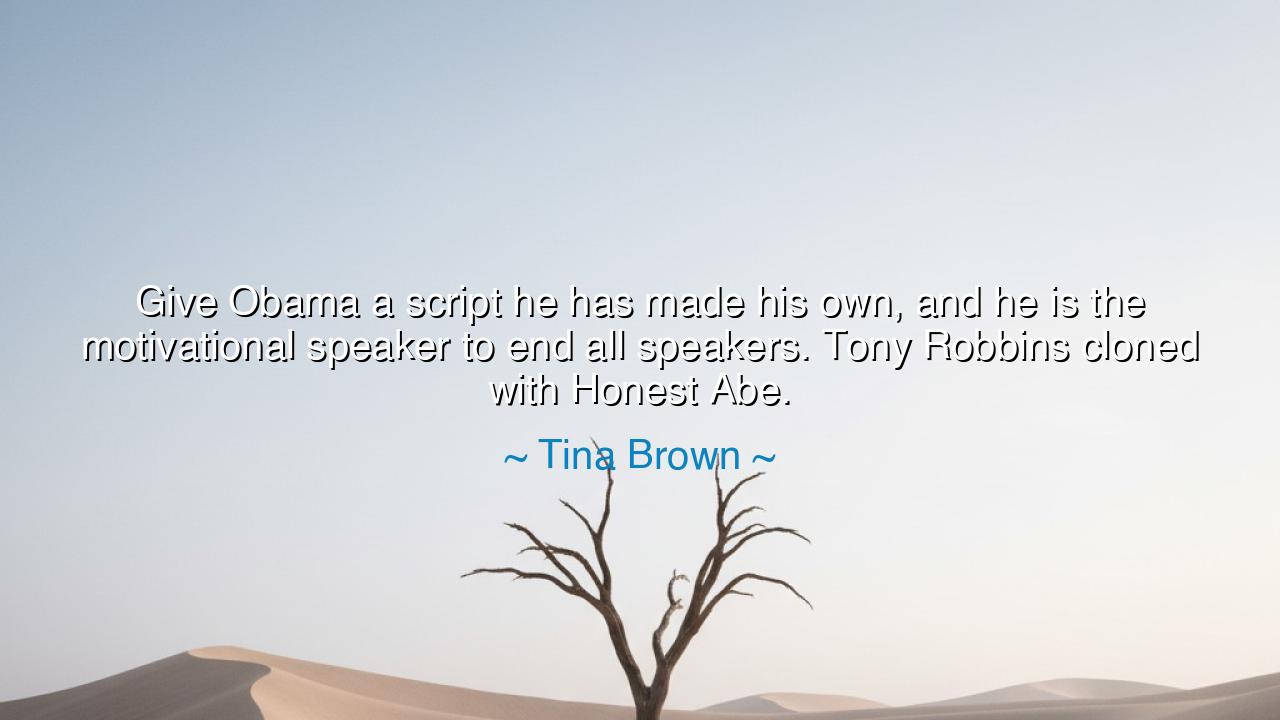
Give Obama a script he has made his own, and he is the
Give Obama a script he has made his own, and he is the motivational speaker to end all speakers. Tony Robbins cloned with Honest Abe.






Hear the words of Tina Brown, who spoke of a figure both modern and monumental: “Give Obama a script he has made his own, and he is the motivational speaker to end all speakers. Tony Robbins cloned with Honest Abe.” These words, though clothed in wit, shine with deep truth. For they recognize in Barack Obama the rare fusion of charisma and authenticity, of inspiration and integrity. He is described as a speaker beyond comparison, a man whose voice could lift hearts, move nations, and stir even the weary to hope.
At the heart of this saying is the mystery of speech—not mere words, but words made flesh by the conviction of the one who speaks them. Brown does not say that any script would make Obama great; rather, it must be one “he has made his own.” Here lies the secret of all true oratory: sincerity. A speech without ownership is hollow, no matter how polished. But when a leader speaks words that rise from his own heart, they take on a force that no artifice can equal. Obama’s gift, as Brown reveals, was not simply eloquence, but authenticity married to eloquence.
Brown compares him first to Tony Robbins, the modern master of motivation, who fills stadiums with fire, urging ordinary people to believe in extraordinary possibilities. In this likeness, Obama embodies energy, charisma, and the ability to awaken confidence in the hearts of the multitude. Yet she also likens him to Honest Abe, Abraham Lincoln, whose words—spare, simple, yet thunderous in moral weight—reshaped a fractured nation. To be seen as both is to carry the best of two traditions: the inspiration that drives individuals to act, and the integrity that anchors such inspiration in timeless truth.
Consider, for example, Lincoln’s Gettysburg Address. In less than three minutes, he consecrated not only a battlefield but the very soul of a nation, declaring that government of, by, and for the people would not perish. His words endure because they were not mere rhetoric—they were conviction given breath. Likewise, Obama’s speeches at moments of crisis, such as his address on race in Philadelphia in 2008, carried weight because they were not only skillful—they were deeply personal, forged in his own journey. This is what Brown captures: the blending of motivational fire with moral gravity.
The deeper meaning is that oratory is a form of leadership, and leadership itself is inseparable from the power of words. Nations are not moved by numbers alone, but by vision. Armies may win wars, but speeches win hearts and shape futures. Obama’s strength as described here lies in being the “speaker to end all speakers”, not because of performance, but because he combined the energy to rouse with the honesty to ground. Few in history have wielded such balance; fewer still have done so with grace.
And yet, there is also a lesson in humility here. Brown implies that Obama’s greatest strength emerges when the words are aligned with his truth. When speeches become detached from ownership, even the most gifted speaker risks falling into emptiness. The power lies not in the script itself, but in the union of word and life. Thus, the greatness of any speaker—or leader—rests not only in how they speak, but in whether they live the very truth they proclaim.
What lesson, then, must we take? It is this: let your words be your own, rooted in your convictions and shaped by your integrity. Do not speak merely to impress, but to awaken. Strive to combine energy with honesty, passion with principle. Learn from the examples of Tony Robbins, who shows the fire of motivation, and Abraham Lincoln, who shows the moral weight of truth. For when you speak in this way—authentically, courageously, sincerely—you too may inspire others not just to listen, but to believe and to act.
Thus let it be remembered: the greatest speeches are not performances but revelations of the soul. Obama, in Brown’s words, stands as the union of charisma and character, the modern proof that words, when owned and lived, can still move mountains. May we, too, learn to wield speech not as decoration, but as the instrument of change, breathing life and hope into all who hear.






AAdministratorAdministrator
Welcome, honored guests. Please leave a comment, we will respond soon